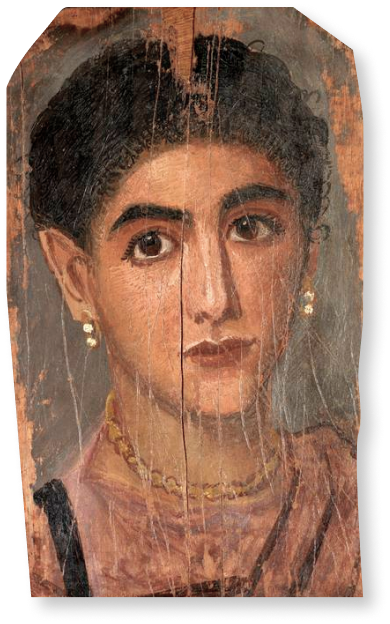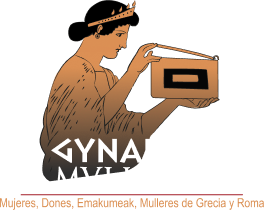
The mission of the Gynaikes, Mulieres: Mujeres, Dones, Emakumeak, Mulleres de Grecia y Roma project is to compile a corpus of materials referring to ancient women preserved in the archaeological museums of Spain, which brings together in virtual form all the archaeological evidence preserved, including epigraphy.
A selection of literary documents referring to the women of antiquity in Hispania and, by extension, to the women of Greece and Rome, has been added to the compilation of this material evidence. The aim, therefore, has been to design and build a web-app containing an on-line database with literary, epigraphic, archaeological and numismatic sources, with 3D models, on the women of Greece and Rome that demonstrates how text and image, through the network, constitute the fundamental instrument for the study of gender in ancient Greece and Rome and the transfer of knowledge.
Gynaikes, Mulieres provides didactic resources for the scientific and recreational dissemination of gender in ancient Greece and Rome and, in particular, of the Digital Humanities and Classical Culture through the 3D digitization of inscriptions, jewellery and other objects traditionally assigned by patriarchal reason to the so-called mundus muliebris or feminine universe, namely, to gather a documentary corpus of literary sources related to gender and the condition of women in Greece and Rome, but also on masculinities, homoeroticism or LGTBI+ identities, as well as to digitise materials deposited in our museums.
Our values
Beyond the transfer of knowledge to society, from the field of the specialist, in the university or in primary or secondary school, our values are based on the need to undertake educational, co-educational and informative actions that help to eliminate gender asymmetries and inequalities and collaborate in the creation of an egalitarian, fair and inclusive society.
We are fully convinced of the need to create co-educational materials that raise awareness of the imperative of equality and respect for difference, and we believe that the new information and communication technologies are a privileged means of democratising access to knowledge and reaching all audiences, regardless of cultural level, social class or ideology.
Why Gynaikes, Mulieres: Mujeres, Dones, Emakumeak, Mulleres de Grecia y Roma? Because we are convinced that access to information in our mother tongue favourably predisposes and facilitates learning, and especially bearing in mind, beyond the linguistic rights of citizens, that the language of instruction in primary and secondary education is the language of each autonomous community, as established by their respective autonomous statutes and included in their own educational regulations or in the constitution itself. This corroborates the Latin maxim variato delectat, and reflects the fact that Spanish society is made up of citizens eager to know the history of the gynaikes and mulieres of Greece and Rome, also in the mother tongue of the women, mujeres, dones, emakumeak or mulleres, and of the men, hombres, gizonak and homes of our country.
We insist, Gynaikes, Mulieres, Mujeres cannot be an end in itself, but a web-app through which the values of equality and respect for difference are disseminated, where all types of LGTBI+ identities fit and where nothing is more important than people, humanity and humanity.

Mujeres
adignatinum sit

Revisión histórica
adignatinum sit

Divulgación
adignatinum sit

Visibilizar
adignatinum sit
El equipo
IP: Manel García Sánchez (University of Barcelona)
Our team is formed, in scrupulous compliance with gender parity, by people with extensive experience in the study of gender in classical antiquity and the democratisation and transfer of knowledge thanks to the commitment to the digital humanities.
The team’s experience is more than contrasted both in gender studies and in digital humanities. The three subgroups are made up of historians, philologists, archaeologists, both from universities and primary and secondary schools, as well as young PhD students who facilitate the connection with a younger audience.
The subgroup on Greece is made up of: Manel García Sánchez (UB), Ignacio Borja Antela Bernárdez (UAB), Margalida Capellà Soler (UAB; INS Premià de Mar), Irene Cisneros Abellán (IES La Atalaya, Las Palmas de Gran Canaria), Sergi Grau Guijarro (UB), Lola Mirón Pérez (UGR), César Fornis Vaquero (US), Francisco Javier González García (USC), Roser Homar Pérez (UB), María Vanesa Mariño Calvo (USC), Ivan Monmany Mendaña (INS Montserrat Roig, Terrassa), Marta Oller Guzmán (UAB), Ana Ovando Moros (IES Violant de Casalduch, Castellón), Laura Sancho Rocher (UNIZAR), Susana Reboreda Morillo (UVIGO), Unai Uriarte Asarta (US), Irune Valderrábano González (USC), Elena Duce Pastor (UAM), Meritxell Blay Boquera (INS Cambrils), Gemma Fortea Domènech (INS Badia i Margarit, Igualada), Abel Morcillo León (IES Saénz de Buruaga, Mérida) and Oriol Morillas Samaniego (UB research technician).
The subgroup Republican and High Imperial Rome is formed by: Antonio Aguilera Martín (UB), Carmen Alarcón Hernández (UPO), Nova Barrero Martín (MNAR), Carlos Cabanillas Núñez (IES Santiago Apóstol, Almendralejo), Manuela Domínguez Ruiz (INS Pere Calders, Cerdanyola del Vallès), Laia De Frutos Manzanares (UB), Coré Ferrer-Alcantud (UJI), Ignasi Garcés Estallo (UB), Renata Senna Garraffoni (UFPR, Universidade Federal do Paraná, Brasil), Sebastià Giralt Soler (UAB), María Aidé Gómez Robledo (UB), Helena López Gómez (USC), Borja Martín Chacón (UB), Mª Pilar Molina Torres (UCO), Trinidad Nogales Basarrate (MNAR), Pablo Ozcáriz Gil (URJC), Carlos Palacín Copado (UB), Pilar Pavón Torrejón (US), Jordi Pérez González (UDG), Lluís Pons Pujol (UB), Gemma Puigvert i Planagumà (UAB), Víctor Revilla Calvo (UB), Gabriel Rosselló Calafell (UIB), Cristina Rosillo López (UPO), Carla Rubiera Cancelas (UNIOVI), Elena Torregaray Pagola (UPV/EHU) and Borja Vertedor Ballesteros (UIB).
The sub-group on Low-Imperial Rome and Late Antiquity is made up of: Henar Gallego Franco (UVA), Lorena Garri Catchot (UB), Juan Antonio Jiménez Sánchez (UB), María del Mar Marcos Sánchez (UNICAN), Clelia Martínez Maza (UMA), Pere Maymó Capdevila (UB), José Antonio Molina Gómez (UM), Elisabet Seijo Ibañez (UB, INS Pompeu Fabra, Martorell), Rosario Valverde Castro (USAL) and José Vilella Masana (UB).
Mª Pilar Molina Torres (UCO), as an expert in social sciences didactics, as well as primary and secondary school teachers have supervised that the project meets the competences needs of the students. Ángela Alcocer Monteagudo (IES La Poveda, Arganda del Rey), Patricia Arias Chachero (IES Fermín Bouza Brey, Vilagarcía de Arousa), Núria Cardona Arnau and Núria Casat Martínez (INS Pere Calders, Cerdanyola del Vallès), Sandra Casat Martínez (Escola Turó de Can Matas, Sant Cugat del Vallès), Juana María Gómez Sánchez (INS Francesc Macià, Cornellà de Llobregat), Francisco Lazo Montero (INS Pere Calders, Cerdanyola del Vallès), Gema Martín Martínez (Colegio Sagrada Familia, Ciudad Real), David Martín Sánchez (Gobierno de Navarra), Alicia Martínez Rivas (IES Ana María Matute, Velilla de San Antonio), Eva Orri Terrado (INS Sabadell, Sabadell), Esther Jezabel Paz Jiménez (Colegio Villamadrid Rivas Vaciamadrid), Fco. Javier Rueda Portilla (Conselleria d’educació i cultura de les Illes Balears), Alicia Satué Lantarón (IES Koldo Mitxelena, Errenteria, Gipuzkoa) and María Tajuelo Hidalgo (CEIPSO El Cantizal, Las Rozas), Eduard Vives Toro (INS Pere Calders, Cerdanyola del Vallès) have been responsible for the definition and revision of language and competence in social sciences, classical languages, Spanish, Catalan, Basque, Galician and English, both in primary and secondary education.
The creation of the photogrammetric 3D models has been carried out by the company 3D Stoa – Patrimonio y tecnología, specialized in opening windows to the past to unite technology and heritage through digitization, virtual recreation, 3D printing and other technological tools. The design of the logo and the user manual has been carried out by Toolbox, Gestión y comunicación integral.
Grecia
Roma Republicana y Altoimperial

